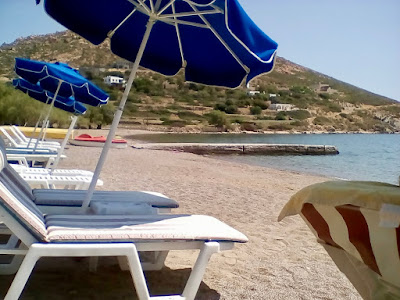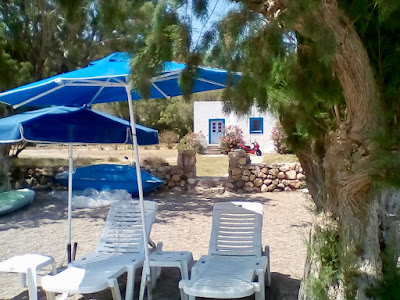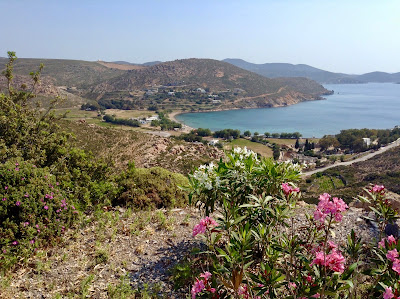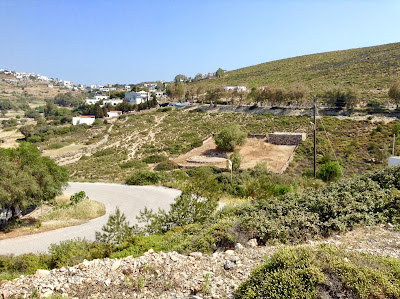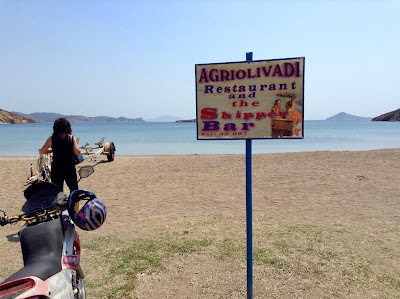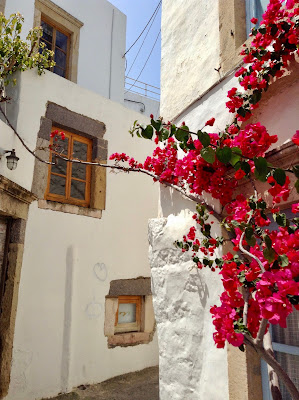 |
| Map, courtesy of Google Maps. |
Back on Patmos, we decided to take a walk from our apartment, which was situated in the top left-hand corner of the bay where sits the main port, Skala, in the area known locally as Netia, up to Kampos toward the North of the island. Of course, the map above shows the area where we stayed as Etia. Seasoned Grecophiles will be well acquainted with the regular variations in spelling one sees for Greek map locations.
The gently-sloping, stepped path leading down from our accommodation meets the road just metres from the junction near the boatyard on the water front. Turning left we were exiting 'civilisation' within a couple of minutes. We climbed steadily and negotiated a couple of very tight bends, with nowhere really to get off the road if a vehicle came, until the road straightened out somewhat and we passed the only other petrol station on the island apart from the one down near the boatyard.
 |
| This is the South-West corner of the bay to the West and North of Netia. Seen from the near-hairpin bend in the road as it climbs away from the village. |
As we continued steadily climbing, we soon arrived at the spot that every Greek island anywhere which supports a community will have - the local football pitch. It's clearly visible on the map above, although you may have thought it was a pool. the surface is astroturf, rather a good idea in this climate, don't you think?
Cresting a hill fifteen minutes later you then get your first view of the beautiful beach at Agriolivadi, which was always spelt on the map we held as Agriolivado. See my comment above! This is the first view you get of the bay...
Smack, dab in the middle of this photo below you can see a threshing circle. We've come across these on other islands in the past, but they're becoming very rare nowadays. Just in case you aren't sure how they work, the system has been in use since Bible times (in fact the Bible refers to 'threshing circles' or 'threshing floors' on a number of occasions) and involves the harvesters pitch-forking the newly harvested and dried grain into the air on a breezy day, to allow the wind to blow away the chaff, while the rather heavier grains fall back to the ground within the circle, from where they can then be gathered up and stuffed into sacks.
This one is only a mile or so before you enter the village of Kampos, which can be seen in the background.
We'd expected to take around 50 minutes to get to the village, but we were there in 40. It's the only other permanent habitation on the island outside of Hora and the Skala/Netia area below it. You haven't walked too far into the rather strung-out village when you reach this quite pleasant little square.
From here you can walk further into the main part of the village, but there's not all that much to see up there. You can also take the beach road, leading a couple of km down to Kampos Beach. We decided to give that a miss (owing to the season, it was bound to be to quiet) and avail ourselves of a frappé in the rather inviting café/bar called Aroma.
The only other customers were a working man sitting alone and this elderly local couple, with their backs to the wall (see next photo below). As we'd come to expect, everyone greeted us as we came in and selected a place to sit. The old couple were having a spirited discussion, both about politics and the recent lottery win, with the man, who was seated behind Yvonne-Maria in the photo below. The woman had a fairly large medical dressing on her upper arm and so could rightly feel slightly sorry for herself. We didn't participate in this discussion, but cocked a ear for a while.
There had been a 2.5 million Euro win on the Greek National Lottery and the winner was a Patmos resident. Oddly enough, we'd also learned of this from the Facebook page of the Rodiaki newspaper, which had carried a photo of the retailer who'd sold the ticket along with the story. The winner, however, had elected to keep it quiet and so the hot topic of conversation everywhere was the identity of the winner.
Of course, owing to the fact that the retailer's identity was known, it kind of narrowed down the likely neighbourhood of the winner, but no one we spoke to seemed to have a clue as to who it was. There are only 3,000 residents on the island anyway, so it's inevitable that it'll get out one day, doubtless when the person takes delivery of his new Mercedes cabriolet, as Theologos, one of the waiters at the Petrino Bar suggested.
I had fun asking our favourite waiters/waitresses in our favourite bars/tavernas "So, what will you do with the money, then?"
Dimitris, in the Petrino bar, replied: "Listen, if it had been me, you wouldn't have seen me for dust! I certainly wouldn't still be at work today!"
This old couple evidently had a lovely relationship, although by the looks of them they must have been married over four decades and more likely five. When they got up to leave, and it was handshakes all round, we watched them walk across the plateia to the other side, where there's (as you'd expect) a church. Parked in the plateia beside the church wall was an old Japanese van (the back of which is just visible in the first photo of the square, above). It was hand-painted that vibrant blue that the Greeks all use for their plant pots, their shutters, doors and their taverna chairs. It's a blue the Greeks call "γαλα'ζιο", "gala'zio", which translates basically as 'light blue', but that doesn't do it justice. Gala'zio is the very blue of a Greek mid-summer's sky. It's Greek blue through and through.
Anyway, that modest van was evidently lovingly maintained and looked to be in very good running condition, even though I'd say it must have been almost as old as the old couple's marriage. It sat perkily on its springs in a way that bespoke good maintenance, and it sported a set of very recently-fitted tyres. What touched us, and told us much about the relationship between the old man and his wife, was the fact that, as they crossed the square, they held hands like teenage lovers. When they reached the van, the husband walked his wife to the door on her side, opened it for her and assisted her gently into her seat, before lightly closing the door for her, and only then walking around to his side of the vehicle.
As they drove off I remember thinking 'that engine sounds sweet as a nut' and there was no great cloud of smoke indicating any health problems with it either. I must admit to the fact that my eyes pricked in the corners and I watched that van until it disappeared, thinking all the while, I believe that old papou treats his wife with every bit as much care as he does that van. Or should that be the other way around?
 |
| "Did you write these legs?" - Any Spike Milligan fans out there who can tell me where those words come from? |
It was while we sat there, taking in the environment that, during the summer months would doubtless be a lot different, we both decided that it would be nice to eat something mildly naughty with our iced coffees. Peering into the murky interior of the building, I could see that there was no evidence of the place being a zaheroplasteion, it was merely a traditional kafeneion with a nice contemporary line in exterior decor. Anyway, I thought I'd chance my arm and so I walked to the back of the room inside, where, just emerging from the kitchen door, was the proprietor's wife.
"Oriste", she said, "What can I do for you?"
"You don't have any glika by any chance do you? Bougatsa, something like that?" I rather hopefully replied.
"Sorry, no." She replied.
"It's just that we fancy something to go with our coffee. Even a piece of cake would do." I suggested, not with all that much conviction remaining, it has to be said.
"Ka'ik? We have ka'ik, yes!" She said, with an air of triumph. Interestingly, 'cake' is one of those words that's been transliterated into the Greek language.
She bade me go out and sit down and said she'd bring us out a small piece of cake each. If you know anything about a Greek breakfast, then you'll know that this kind of two-tone cake often features in the centre of the morning table, since it goes well with a filter coffee, something which the Greeks share with the Americans as a breakfast staple...
That cake went down very well and, when it came time to leave and pay the owner and his wife, (after a half-hour conversation during which the owner had declared that all politicians were a waste of space and a bunch of thieving ****???•••, and that Mr. Tzipras was a Benedict Arnold of the highest order), they brought us the bill - four Euros.
On the way back to Netia, we took the detour down to Agriolivadi beach for a closer look...
After a short reccy, we decided that a whole day here was going to be a must. From this beach back to our balcony was a very acceptable and do-able twenty-five minutes walk.
Slam dunk, See you next post!


